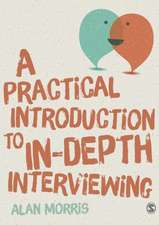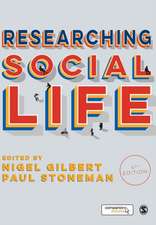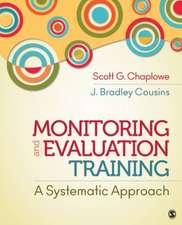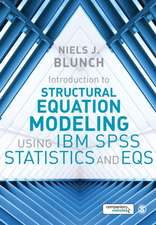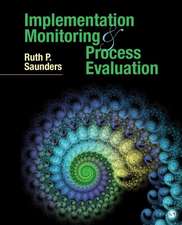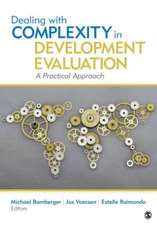Basic and Advanced Focus Groups
Autor David L. Morganen Limba Engleză Paperback – 12 sep 2018
Preț: 392.70 lei
Preț vechi: 503.46 lei
-22% Nou
Puncte Express: 589
Preț estimativ în valută:
75.15€ • 78.72$ • 62.28£
75.15€ • 78.72$ • 62.28£
Carte disponibilă
Livrare economică 18 martie-01 aprilie
Livrare express 04-08 martie pentru 28.07 lei
Preluare comenzi: 021 569.72.76
Specificații
ISBN-13: 9781506327112
ISBN-10: 1506327117
Pagini: 216
Dimensiuni: 187 x 232 x 14 mm
Greutate: 0.41 kg
Ediția:1
Editura: SAGE Publications
Colecția Sage Publications, Inc
Locul publicării:Thousand Oaks, United States
ISBN-10: 1506327117
Pagini: 216
Dimensiuni: 187 x 232 x 14 mm
Greutate: 0.41 kg
Ediția:1
Editura: SAGE Publications
Colecția Sage Publications, Inc
Locul publicării:Thousand Oaks, United States
Recenzii
“This is great tool for their students or themselves if they want to use focus groups as a research approach. There is a lot of value for the price of this text.”
“This introductory text provides students with a solid understanding of principles, methods, and contributions of focus group methodology. It provides good coverage of the topic and essential components for consideration in using focus groups. Morgan is among the most well-known experts on focus group research; this current volume reflects how his insight and own research have evolved over the years to show how the field has changed.”
“This book provides accessible, practical information that is targeted toward an audience unfamiliar with the logistics of conducting focus groups.”
“The chapters contain enough depth for the text to serve as a one-stop shop for designing and using a focus group methodology.”
“Overall, the book is written in a language that is easy to understand (despite the topics the book is covering) for undergraduate students who may not be interested in research methods and have taken it as a required course in their curriculum.”
“I was pleasantly surprised at how useful the appendices are. Each of them provides information that will help a researcher. Including transcribed text is good because new researchers may not have been exposed to this type of data. In addition, the interview guides are useful tools and can be used in other forms of research as well.”
“This introductory text provides students with a solid understanding of principles, methods, and contributions of focus group methodology. It provides good coverage of the topic and essential components for consideration in using focus groups. Morgan is among the most well-known experts on focus group research; this current volume reflects how his insight and own research have evolved over the years to show how the field has changed.”
“This book provides accessible, practical information that is targeted toward an audience unfamiliar with the logistics of conducting focus groups.”
“The chapters contain enough depth for the text to serve as a one-stop shop for designing and using a focus group methodology.”
“Overall, the book is written in a language that is easy to understand (despite the topics the book is covering) for undergraduate students who may not be interested in research methods and have taken it as a required course in their curriculum.”
“I was pleasantly surprised at how useful the appendices are. Each of them provides information that will help a researcher. Including transcribed text is good because new researchers may not have been exposed to this type of data. In addition, the interview guides are useful tools and can be used in other forms of research as well.”
Cuprins
Preface
About the Author
PART I. BASIC ISSUES
Chapter 1. Introducing Focus Groups
Basic Issues
Advanced Topics
Chapter 2. Uses for Focus Groups
Basic Issues
Advanced Topics
Chapter 3. The Importance of Interaction
Basic Issues
Advanced Topics
PART II. DESIGNING FOCUS GROUPS
Chapter 4. Research Design for Focus Groups
Basic Issues
Advanced Topics
Chapter 5. Group Composition, Group Size, and Number of Groups
Basic Issues
Advanced Topics
Chapter 6. Asking Questions in Focus Groups
Basic Issues
Advanced Topics
Chapter 7. Moderating the Discussion
Basic Issues
Advanced Topics
Chapter 8. Analyzing Focus Groups
Basic Issues
Advanced Topics
PART III. ADVANCED TOPICS AND CONCLUSIONS
Chapter 9. Working Cross-Culturally
Basic Issues
Chapter 10. Specialized Age Groups
Basic Issues
Chapter 11. Online Focus Groups
Basic Issues
Chapter 12. Conclusions: Future Directions for Focus Groups
Basic Issues
APPENDICES
Appendix 1
Statement of Informed Consent
Appendix 2
Generic Focus Group Introduction
Appendix 3
Three Examples of Interview Guides
Appendix 4
Experiences as Graduate Students
Glossary
References
Index
About the Author
PART I. BASIC ISSUES
Chapter 1. Introducing Focus Groups
Basic Issues
Advanced Topics
Chapter 2. Uses for Focus Groups
Basic Issues
Advanced Topics
Chapter 3. The Importance of Interaction
Basic Issues
Advanced Topics
PART II. DESIGNING FOCUS GROUPS
Chapter 4. Research Design for Focus Groups
Basic Issues
Advanced Topics
Chapter 5. Group Composition, Group Size, and Number of Groups
Basic Issues
Advanced Topics
Chapter 6. Asking Questions in Focus Groups
Basic Issues
Advanced Topics
Chapter 7. Moderating the Discussion
Basic Issues
Advanced Topics
Chapter 8. Analyzing Focus Groups
Basic Issues
Advanced Topics
PART III. ADVANCED TOPICS AND CONCLUSIONS
Chapter 9. Working Cross-Culturally
Basic Issues
Chapter 10. Specialized Age Groups
Basic Issues
Chapter 11. Online Focus Groups
Basic Issues
Chapter 12. Conclusions: Future Directions for Focus Groups
Basic Issues
APPENDICES
Appendix 1
Statement of Informed Consent
Appendix 2
Generic Focus Group Introduction
Appendix 3
Three Examples of Interview Guides
Appendix 4
Experiences as Graduate Students
Glossary
References
Index
Notă biografică
Descriere
Taking a “bi-level” approach, this book gives readers a complete picture of focus groups with coverage of both the “how-to” and the why, and argues against there being any one right way to do the research.











